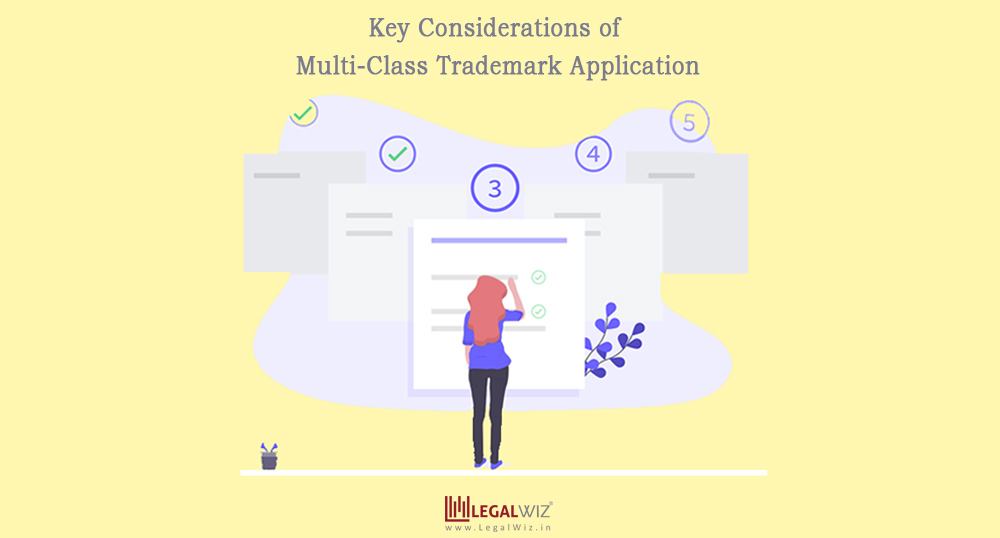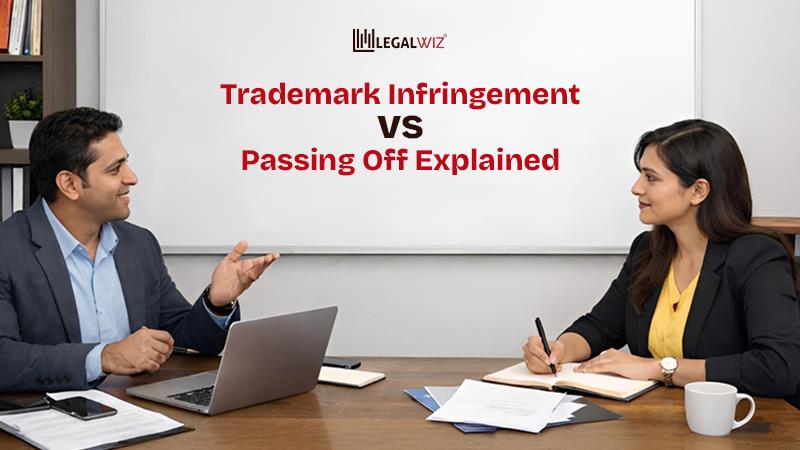Multi-Class Trademark Filing: Key Points to Consider
When your brand operates across more than one product or service category, filing under a single trademark class won’t provide complete protection. That’s where a multi class trademark application becomes essential. While Trademark Class 99 may appear to be a typical classification, it doesn’t represent any specific goods or services. Instead, it’s used by the Trademark Registry as a technical placeholder for applications filed under multiple classes.
This approach simplifies the registration process for businesses with diverse offerings, allowing them to protect their trademarks efficiently across categories. For growing brands with both physical products and digital services, multi-class trademark registration offers both convenience and legal clarity.
Let’s explore what a Class 99 trademark is, when to use it, and how to file a multi-class application for trademark registration the right way.
What is Class 99 in Trademark and How Does Multi-Class Registration Work?
In India, trademarks are regulated by the Trade Marks Act, 1999, which allows businesses to protect their brand names, logos, taglines, and other identifiers under clearly defined classes of goods and services.
India adopts the internationally recognized Nice Classification system, which organizes all goods and services into 45 trademark classes:
- Classes 1 to 34 are assigned to physical goods
- Classes 35 to 45 are reserved for service categories
However, there are cases where a brand needs protection across multiple classes. That’s where Trademark Class 99 comes in.
Class 99 is not a standard classification under the Nice system. Instead, it’s a technical placeholder used by the Indian Trademark Registry to indicate that a trademark application spans more than one class. It is most often encountered during or after a multi-class trademark application.
For instance:
- A cosmetic brand offering both skincare products (Class 3) and salon services (Class 44) would file under multiple classes.
- A tech company selling mobile devices (Class 9) and providing cloud-based software (Class 42) would also require a multi-class filing.
In such scenarios, Class 99 appears in the registry’s backend or search databases to reflect that the application involves several classes, not because Class 99 covers any specific product or service.
This system enables streamlined filing, especially when businesses offer a mix of goods and services, making multi-class trademark registration a practical solution for modern, diversified brands.
What Can You Trademark Under Class 99?
Trademark Class 99 isn’t a traditional class like others—it’s a filing mechanism known as a multiclass application. This option allows you to protect your brand across multiple trademark classes in a single application. It’s ideal for businesses offering diverse goods and services under one brand name.
Here’s how you can use Class 99 to your advantage
- Brand name for multi-service businesses – For example, a company selling skincare products (Class 3) and offering dermatology consultations (Class 44).
- Product and service combinations – Such as a SaaS platform (Class 42) that also provides business consulting (Class 35) or training programs (Class 41).
- E-commerce ventures – If you sell products (Classes 1–34) and offer related fulfillment or retail services (Class 35), a multiclass application ensures complete protection.
- Franchise and licensing operations – Businesses offering both goods and the brand support to license or franchise it across industries.
- Multi-industry startups and conglomerates – If your brand has sub-brands or verticals that span across industries, Class 99 helps you streamline protection under one roof.
Whether you’re running a single brand across wellness, tech, consulting, and retail or launching products and services under the same identity, Trademark Class 99 lets you do it all in one go.
Intellectual Properties You Should Trademark with a Multiclass Application (Class 99)
When your business spans multiple industries—like tech, finance, legal, and education—it’s not enough to register under a single class. A multiclass application (Class 99) helps protect your brand identity across all relevant trademark classes in one go.
Here’s what you should trademark using a multiclass filing
- Business or Brand Name
Brands like Amazon, Tata, and Reliance operate across sectors—from e-commerce to cloud services, finance, and retail. A multiclass application protects their brand name across various classes like 35 (business services), 42 (tech), and 36 (financial services). - Product or Service Line Names
Offerings like Google Ads, Apple Pay, or Tata Sky Binge cover different sectors and require trademarking under multiple classes—advertising, fintech, entertainment, etc.—to ensure full legal protection. - Logos and Visual Identity
Logos that appear on websites, packaging, software interfaces, and physical products must be protected in every relevant class where the brand operates to maintain consistent brand ownership. - Taglines and Slogans
Phrases like “Think Different” (Apple), “Create Today. Enrich Tomorrow” (Panasonic), and “Growth is Life” (Reliance) need multiclass protection to ensure exclusive use across categories. - App or Platform Names
Names like Google Meet, Paytm Money, or JioSaavn often cross into tech, finance, and media. A multiclass trademark covers all use cases under a single application.
Class 99 multi-class filings ensure every part of your diverse business identity is protected. For growing brands and conglomerates, it’s a smart move for a strong IP strategy and legal security.
List of Popular Brands Using Multiclass Trademark Registration (Class 99)
Leading brands often operate in diverse sectors, from tech and finance to media and retail. To simplify protection across these varied services, they opt for Class 99 multi-class applications instead of filing separately for each category.
Here are a few examples:
- Amazon – Registered across classes for e-commerce (35), cloud computing (42), and digital media (38) through multiclass applications.
- Tata Group – Covers automobiles (12), consulting (35), software (42), and financial services (36), all under unified multiclass trademark filings.
- Google – Uses multiclass registration for services like advertising (35), cloud technology (42), and payment apps (36).
- Paytm – Registered under fintech (36), e-commerce (35), and tech services (42), reflecting its diverse platform model.
- Reliance Industries – Protects brands like Jio, AJIO, and JioSaavn across telecom (38), retail (35), entertainment (41), and software (42).
- Microsoft – Uses multiclass filings to protect its products across enterprise consulting (35), cloud solutions (42), and educational tools (41).
- Apple – Protects brands like Apple Pay, iCloud, and Apple Music through multiclass filings across tech, media, and financial services.
Why Register Your Trademark Under Class 99?
For businesses offering a mix of goods and services, like software, consulting, and e-commerce, Class 99 multi-class registration is a strategic and efficient way to protect your brand across all relevant categories.
Key Benefits of Multiclass Trademark Registration
- Protect Your Brand Across Categories – Secure legal ownership for your brand name, logo, or tagline in all relevant classes with a single application.
- Simplify the Filing Process – Avoid the hassle of submitting separate applications for each class. Class 99 allows you to manage everything under one filing.
- Save Time and Costs – Reduce paperwork and legal fees associated with multiple individual trademark filings.
- Ensure Consistent Protection – Get uniform protection for your brand across product lines, services, and industries.
- Plan for Business Expansion – If you plan to diversify in the future, multiclass registration future-proofs your brand against overlapping uses or conflicts.
- Ideal for Modern Businesses – Perfect for startups, platforms, and conglomerates operating across tech, finance, logistics, consulting, and beyond.
Key Elements of a Trademark Multi-Class Application
When your business spans multiple product or service categories, it’s important to protect your brand in all relevant trademark classes. Trademark Class 99 makes this easier by allowing a single application to cover multiple classes.
1. Single Application for Multiple Classes
A multi-class trademark application is essentially a single application covering multiple trademark classes. Instead of filing separate applications for each class, the applicant can consolidate them under one application using Class 99. This means that all classes are processed and examined collectively by the trademark registry.
Before filing, it is advisable to identify the applicable classes using tools like our Trademark Class Search Tool, which can help you determine which classes are relevant for your product or service.
2. Easy to file
Filing separate applications for each class can be time-consuming and repetitive. A Class 99 multi-class application reduces paperwork and ensures accurate, consistent information across all classes.
3. Trademark application fees
The government fees remain the same whether you file separate applications or a single Class 99 application. It’s ₹4,500/- per class for proprietors, MSMEs, or Startups, and ₹9,000/- per class for other applicants.
4. Delay in the process due to a single application
If you file a multi-class trademark application and there’s an issue or objection in any one class, the entire application gets delayed until that issue is resolved. This happens because the trademark office needs to assess the registrability of the mark in each class included. Even a single objection can put the full application on hold, leading to delays and extra costs.
If you’re unsure about the availability of your trademark in some classes, it’s often better to file separate applications. This helps avoid unnecessary delays and can simplify the examination process for each class.
However, separate filings can also be more time-consuming and expensive than a single multi-class application. It’s best to assess your situation and consult a trademark expert to choose the most suitable filing strategy. You can learn more about choosing the appropriate class for trademark registration here.
5. Rejection of an application
In multi-class applications, one objection can lead to the rejection of the entire application. If the trademark registry issues an objection under one class or if a third party files an opposition that does not get resolved, the whole application gets rejected, even if the mark is valid in the other classes.
To avoid such risks:
- Consider filing separate applications for each class, especially if there’s a likelihood of opposition.
- Always seek professional legal assistance to ensure correct classification and to pre-empt possible objections under Section 9 of the Trade Marks Act.
6. Trademark must be in use in each class
Trademark registration is valid only if the trademark is used or intended to be used in each class for which registration is obtained. If the applicant is not actively engaged in business activities under any of the registered classes, the registry may cancel the registration for that specific class.
Hence, it’s critical to file for registration only in the classes relevant to your business operations. Misuse or non-use can result in the loss of rights in classes that don’t represent active commercial use.
10,000+ Brands Trust LegalWiz.in for Trademark Protection
LegalWiz.in has empowered thousands of brands, ranging from tech startups and service providers to product-based businesses, to protect their identity across multiple classes through accurate Class 99 multiclass trademark registration.
Why Choose LegalWiz.in for Your Multiclass Trademark Filing?
Whether you run a diverse platform, sell goods and services, or plan to expand into new verticals, LegalWiz.in ensures your trademarks are filed under the right classes—all in one go.
- Accurate Class Mapping – Our experts identify every relevant class for your offerings to prevent rejection or underprotection.
- 100% Online Process – Complete your multiclass application from anywhere—no physical paperwork needed.
- Transparent Pricing – Clear fee structure, even for multi-class filings—suitable for startups, growing brands, and conglomerates.
- End-to-End Legal Support – We handle everything from application to examination, objections, and renewals.
- Trusted Across Industries – Businesses across industries rely on us to secure their multi class trademark registrations with accuracy and ease.
Get Your Trademark Registered Today!
Register under Trademark Class 99 with LegalWiz.in and ensure your name stands out—legally and commercially.
? Book a free consultation
Frequently Asked Questions
What is a multiclass trademark application?
A multiclass application lets you register your trademark under multiple goods and/or services classes with one form, rather than filing separately for each.
When should I opt for Class 99?
If your business offers a mix of products and services (e.g., software + training + consulting), Class 99 is ideal for consolidated trademark protection.
Is it more expensive to file a multiclass trademark?
You’ll pay fees per class, but the process is faster and more organized than filing each class individually.
Can I add classes later if I expand my business?
Yes, but it would require a new application. Filing under Class 99 from the beginning ensures long-term protection across categories.
What happens if I choose the wrong class?
If you choose the wrong trademark class, your application may still get processed, but your trademark won’t be legally protected for the relevant services. This means others could legally use a similar mark in that correct class, and you wouldn’t have grounds to stop them. Moreover, trademark fees are non-refundable, so you’d have to file a new application in the correct class and pay the fees again.
How long does registering a trademark take?
Trademark registration in India typically takes 6 months to 2 years, depending on any objections or third-party opposition. For a detailed overview of the process, read our complete guide on trademark registration process in India.
How long is my trademark valid, and how often should I renew it?
In India, a registered trademark is valid for 10 years. You must renew it every 10 years—either within 6 months before or after expiry—to maintain your rights.
Does LegalWiz.in help with multiclass filings too?
Absolutely. Our experts specialize in identifying and registering the right combination of classes based on your business model.

Amisha Shah
Amisha Shah heads content at LegalWiz.in, where she transforms complex legal concepts into clear, actionable insights. With extensive experience in legal, fintech, and business services, she helps startups and enterprises navigate regulatory challenges through engaging, accurate content that empowers informed business decisions.
4 Comments
Leave A Comment








Hello,
If we have registered a trademark application in 5 Classes and we want to continue in only 2 classes which form and procedure we should follow?
Hi Ashish, all that’s required is for you to write a letter of withdrawal (MIS-W) stating the classes you want your trademark removed from. I hope this helps, please reach out to us in case of anything else!
99 me trade mark karne ke baad kitna samay milta hai sab ketegri me name ko use karne ka
For class 99, once you have received application number you can use brand name with TM symbol and after receiving of registered certificate, you can put R symbol on your brand name